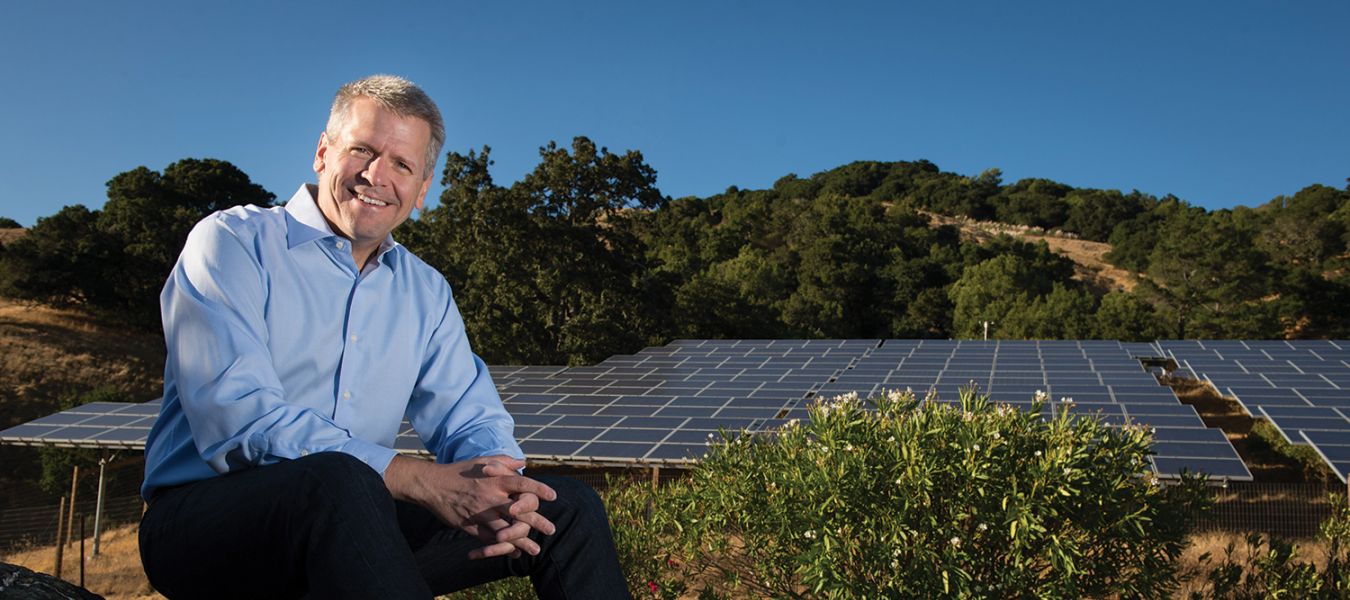
T'90
Mike Miskovsky
CEO and president, InEVit
Energy entrepreneur Mike Miskovsky is bullish on the future of electric vehicles even though he doesn’t think much of today’s electric cars. “They don’t have enough range, they cost way too much, and they don’t last long enough,” he says, and that’s because the batteries aren’t good enough. “The battery is the most expensive part of the vehicle, and in order to service it you basically have to destroy the car.”
The solution is a better battery system, comprised of slide-in “modules” that can be easily serviced and replaced, and Miskovsky thinks he has it. “Our systems are designed in a very clever way to be 30 to 100 percent more energy dense, 30 times faster to manufacture, and easy to replace or upgrade over the vehicle’s life,” says Miskovsky, who has partnered with original Tesla co-founder Martin Eberhard in the venture, called InEVit (the first three syllables of “inevitable”). Miskovsky is CEO and Eberhard is chief technology officer. The company’s 26 patents include an improved battery management system, and techniques that enable standard lithium ion cells to safely be packed more tightly together. InEVit plans to freely license the system design and manufacturing processes, while selling proprietary controller chips that make the system work.
The trick will be to convince carmakers to build their vehicles around InEVit’s battery design, which Miskovsky likens to a standard D-cell for the electric vehicle industry. “If you have a flashlight and you haven’t put batteries in it for 20 years, you can drop by any drug store and buy new ones—and the flashlight will still work,” he says. “It should be the same for electric vehicles.”
Miskovsky has a talent for disruption. After Tuck he went to work in new business development at Time Warner, where he launched SI Television, Sports Illustrated’s first foray into digital media. “I sat in meetings in Silicon Valley with kids who were just out of college, some with blue hair, and they were having the time of their lives,” Miskovsky says. “It was one of those moments when a big transition was occurring and I realized I had to be out here.”
A succession of startups followed, notably Zep Solar, which became a U.S. standard for mounting hardware for rooftop solar installations. The key was convincing 16 of the world’s top 20 solar panel manufacturers to redesign their product to mate with Zep’s standards and hardware. “Our system allowed crews on the roof to be up to five times faster, allowing the entire installer community to finally make money reliably,” says Miskovsky. Now he wants to repeat the formula with electric vehicles.
“I’ve already run this play once,” Miskovsky says. “And what it showed is that if you get it right, you can convince otherwise competitive companies to adopt a standard in the interest of something greater: dramatic reductions in costs, allowing everyone in the industry to succeed.”
Continue Reading
Related Stories
Less Waste, Longer Use: Meet Nike’s Peggy Reid T’98
Through profitable reuse and recycling programs like Nike Grind, Circular Economy Director Peggy Reid T’98 is helping eliminate waste and creating a longer life for Nike’s products.
Read MoreColin Butterfield on Developing Global Leaders
Colin Butterfield T’04 describes his investment process as collaborative and bottom-up, not a top-down approach that follows established trends.
Read MorePhil Giudice
Phil Giudice T'85 is CEO of AMBRI, a Boston-based startup chasing the Holy Grail of renewable energy: cheap, reliable, and massively scalable electricity storage.
Read MoreSarah Barpoulis
Sarah Barpoulis T'91 credits Tuck for a style that lends itself to constructive debate, consensus building, and empowering others, which she sees as the key attributes of successful board members.
Read MoreRobert Wallace
Robert Wallace T'84 is a Baltimore-born entrepreneur who has written six books and runs three companies focusing on information technology, executive coaching, and most recently, renewable energy.
Read MorePace Ralli
Pace Ralli T'09 came to Tuck after the 2003 blackout inspired a career change from corporate finance to energy.
Read MoreDamali Harding
As executive director of nonprofit The Energy Co-op, Damali Harding D’99, T’06 helped Philadelphians increase their renewable energy use for a sustainable future.
Read MoreLee Taylor
Lee Taylor T’12, co-founder and CEO of REsurety, is helping to redefine the way energy companies approach risk in the promising but volatile wind energy industry.
Read MoreAndrew Smith
Andrew Smith T'07 chose Tuck first because he was looking for a beautiful environment where he could spend time thinking about how to maximize his impact on big challenges in the world.
Read MoreThad Hill
As the president and CEO of Calpine, a Fortune 500 power generator and retailer, Thad Hill T’95 is doing exactly what he envisioned when he came to Tuck in 1993.
Read MoreElyse Allan
GE Canada CEO Elyse Allan D’79, T’84 is helping advance the company’s innovation agenda one good idea at a time.
Read MoreDaniel Revers
The new Revers Center for Energy, made possible by Daniel Revers T'89, expands Tuck’s energy programming in the classroom and beyond.
Read MoreEric Spiegel
People call Eric Spiegel T'87 the most natural leader they’ve ever met. Now CEO of Siemens USA, a global electronics and engineering powerhouse, he gets to lead on the issues that matter most. To his company and the country.
Read More